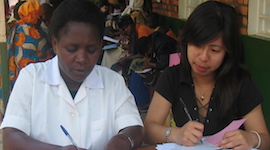WDI Intern Felt Part of Rwanda Community
Wednesday, August 31, 2016
Karen Tam spent three months in Rwanda during the summer of 2009 as a WDI intern, returning in the fall to the University of Michigan with valuable work experience in a developing country, a lifetime of memories and a Rwandan nickname: Umutesi.

Translated as “treasured or valued one,” the name was given to Tam by both the nurses at the hospital where she worked and her host family. Tam, now a Washington, D.C.-based senior consultant for GE Healthcare’s Camden Group, lived with the family – a surgeon dad, two children and the mother Tam still affectionately calls “Mama Benita, who loved me like I was her own.” Living among the people she was working to serve, led to a better experience and better outcomes, Tam said.
“The best way to understand facing the community and recommend practical, actionable solutions is to get embedded,” she said. “It helps you perform so much better. I was a part of the community.”
Tam interned with the Access Project, which seeks to improve the care provided by medical facilities in Rwanda through investments in management, training and infrastructure. For her internship, Tam developed a business plan for scaling solutions to improve operational efficiencies for access the health clinics, pharmacies, and patient registration.
Tam, who was a dual degree master’s student at the Ross School of Business and the Ford School of Public Policy at the time, had studied abroad in Japan as a high school student and in Greece as a University of Chicago undergrad. But Rwanda was different.
“Working in a developing country, living in a developing country – that was life changing,” she said. “And when you’re working in a developing country, as opposed to just living in one, there are expectations. You have deliverables, you have to perform.”
Tam interned with WDI again the following summer, this time traveling to Bangladesh for GE Healthcare in partnership with Grameen Healthcare. She worked on the rural deployment of handheld ultrasound devices, gathering information on the ground for engineers regarding usability, determining clinical pathways for the machine and finding a sustainable business model to serve the poor while remaining profitable.
Unlike her time in Rwanda, her summer in Bangladesh was far more challenging. The support network she had in Rwanda didn’t exist in Bangladesh. Working for a corporation as opposed to a nonprofit was different. And she faced gender discrimination from some people in the field who preferred to hear from her male colleague.
Still, Tam said she was able to pull out positive learnings from her experiences in Bangladesh and gained new perspectives from the challenges there.
“It allowed me to be completely flexible and adaptable,” she said. “Certain things that offended me in the past, I let slide because I built up this thick skin. It taught me to exercise my abilities, stand my ground and be sure my opinion is heard.
“It upped my emotional intelligence, having to constantly do that on the ground. It helped me move forward in my career.”
Tam’s two WDI internships represented a practical way of combining her pre-medicine education as an undergrad, and her business and policy disciplines.
“On the outside, they can be conflicting,” she said. “But when you apply it properly and you have the right kind of conversation with the right kind of stakeholders, I really think that is super powerful.”
Seven years later, Tam occasionally hears from Mama Benita, who sends photos of her now-grown children. That summer working in Rwanda and living with her adopted family, Tam said, “will always hold a special place in my heart.”
